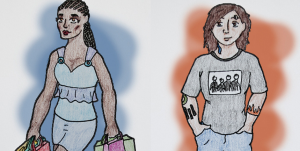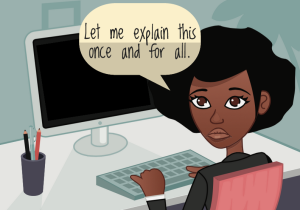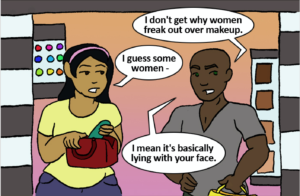Feminist family, I love y’all.
You and other friends in social justice spaces taught me to love every part of myself.
Without the wonderful people who introduced me to feminism, I wouldn’t be the unapologetic black girl I am today.
I owe a lot to feminism, and I’ll never forget that.
But some feminists also frighten me.
As one of the moderators for the Everyday Feminism Facebook page, I read some of the most uplifting and harmful comments.
While some of the page is filled with inspiring testimonies from marginalized voices, thought-provoking questions, and interesting examinations of exclusionary language, there are also many feminists whose comments leave me feeling deeply concerned about our fight for equality.
I’m not talking about the trolls and men’s rights activists who visit the page and pretend to be us. I’m talking about the proud feminists (some self-proclaimed, some with feminist symbols as their profile picture) who frequent the page.
Many feminists commenters have not-so-feminist commenting habits.
While reading these comments, I often think to myself: Wait, aren’t these the same people who are supposed to be about equality? Aren’t these the people who march for justice?
If this group of folks who work for social change doesn’t understand how their thinking alienates people from the feminist movement by oppressing other marginalized folks, progress will be painfully slow.
Collectively and individually, feminists often exclude those of us who need feminism the most.
We need to remove the toxic and exclusionary thinking from our own anti-oppression movements.
We can start by eliminating these harmful commenting habits.
1. ’Splaining of All Kinds
Many feminists are familiar with mansplaining, but there are other forms of ‘splaining that occur in feminist spaces, including thin-splaining, able-splaining, and white-splaining.
For those who don’t know, privileged explaining, also known as “’splaining,” is when a person with privilege explains a form of oppression they don’t experience to a person who experiences it.
This looks like a man explaining catcalling to a woman, or a thin person telling a fat person how they should navigate through a fat-stigmatized world.
When ’splaining, you usually do a number of harmful things:
You incorrectly explain something because of your privileged perspective. You speak over voices who are more qualified to speak on the subject. And you tell marginalized people how to deal with oppression, rather than helping work to alleviate it.
’Splainers often reinforce an unjust status quo. For example, rather than working to make spaces more accessible with content warnings and other appropriate tools, ’splainers tell people with PTSD to “get tougher skin.”
Rather than advocating against state-sanctioned violence toward people of color, ’splainers focus on telling black and brown people how to avoid confrontation with the police.
When posting in a comments section, I encourage you to pause before you press “enter.”
Ask yourself: Am I about to deny the existence of a form of oppression I don’t experience? Would I benefit more from listening instead of commenting? Is my comment encouraging the dismantling of oppression or the continuation of it?
2. Asking ‘How Is This a Feminist Issue?’
Many fellow feminists haven’t been introduced to intersectionality yet. That’s pretty understandable. For a lot of us, myself included, our introduction to feminism is often a type that focuses primarily on the issues of cis white women.
In contrast, intersectional feminism examines the ways in which people of different backgrounds and identities experience oppression. It encompasses many topics including race, dis/ability, gender, mental health, body image, sexuality, class, sexual and romantic orientation, religion, and more.
All of these issues can be feminist issues.
I should also note that the “how is this feminist?” question comes up a lot on articles related to trans issues and race. So if you’re wondering how something is a feminist issue, you might simply need to examine your privilege.
If we’re enthusiastic about issues that affect cis white women, but neglect those affecting people of color, trans people, disabled people, and other marginalized groups, we’re allowing racism, violence against trans people, ableism, and other forms of oppression, which are often linked to sexism, to continue.
Excluding certain forms of oppression from the “feminist agenda” often means taking the side of the oppressor.
3. Asking ‘Aren’t There More Important Issues?‘
Sometimes people think an issue isn’t that big of a deal if it doesn’t involve global poverty, physical or sexual violence, massive amounts of death, or natural disasters.
They’re only concerned if the issue appears catastrophic to a certain degree, and they belittle other issues that don’t “measure up.”
Again, the beauty of a site focused on intersectional feminism is that it can address a wide range of issues from various perspectives. There’s no need to create a scale as to which issues are “more important” than others because we can discuss so many of them (we just can’t do it all at once, of course).
Discussing global poverty one day doesn’t take away from any discussion on sexual violence on another day. These issues are all important and, often, interconnected. So there’s really no competition.
4. Demanding That Other Marginalized Commenters Educate You
Many people in comments sections are there to learn. They want to ask questions and develop an understanding of certain issues they don’t know much about. And that’s great!
But don’t use your thirst for knowledge as a tool to try to force others to educate you.
You might think it’s easy, but educating on topics related to our oppressed identities often requires pulling up statistics, citing sources, retelling heartbreaking stories (for the umpteenth time), and reliving painful memories.
Educating privileged folks sometimes feels more stressful than our actual paying jobs! The emotional labor often isn’t worth it for many marginalized folks.
Now, there are people with superhuman abilities and time to spare who will educate you. You might luck out and find one. If not, try other online sources.
Make use of that handy search tab at the top of the Everyday Feminism website. You’ll find a wealth of information on many topics in social justice. Some of your answers are only a few clicks away.
5. Demanding ‘Not All [Insert Privileged Identity]’
Yes, we know that not all men are catcallers and rapists. We know that not all white people are members of the KKK. No one at Everyday Feminism is saying that.
What we are saying is that white people and men benefit from systems that celebrates whiteness and cis men at the expense of everyone else.
So when you jump in to say “not all,” you derail the conversation by making it about you. You silence and gaslight marginalized voices, and you intrude on a conversation that could have been a space of growth and understanding.
You’ve made yourself part of the problem.
Rather than getting defensive and doing one of those things I just mentioned, figure out the best ways to be an ally for those who don’t experience your privilege.
6. Attempting to Take Up Space in Movements That Aren’t for Us
Many people don’t understand how feminists can talk about inclusivity and then say things like “the body positive movement isn’t for thin people” or “Black Lives Matter, not All Lives Matter.”
People often forget that these are movements established to fight a form of oppression, and uplift those who are oppressed.
You’re not oppressed for being thin, male, white, wealthy, or able, so it makes sense that you are not the main focus of those specific movements. Sure, you may have been harshly teased, and that could have left scars. Believe me, I get it.
My self-esteem took a hit when high school friends nicknamed me “Feed the Children” because I was really thin. But teasing isn’t always oppression. People may tell me I “look hungry” from time to time, but this is not the equivalent of an anti-fat or ableist comment.
Besides, we don’t all have to be at the center of every movement. Certain movements are specifically targeted to support the folks who need it the most.
Focusing on black lives, fat folks, or disabled people doesn’t cast others aside. It simply allows a space for marginalized groups to uplift one another, and fight back against the oppression they face.
In fact, centering the most marginalized people in our communities also benefits those with privilege – while the opposite isn’t true.
And trying to center yourself in a movement about a type of oppression you don’t experience can actually hinder the social progress and equality these movements are fighting for.
Sometimes, it’s better to simply step aside, and be an ally when needed.
7. Assuming That Something Isn’t Racist Just Because It Isn’t Violent
Listen closely to this one, y’all: People who don’t experience racism – ahem, white folks – do not get to define what racism is and isn’t.
Many folks seem to think that people of color are “watering down” the definition of racism by calling things like microaggressions “racist.” Believe it or not, “seemingly harmless” microaggressions uphold a system of racial injustice that attempts to deny the humanity of people of color.
Also, don’t assume that just because something isn’t violent, it isn’t oppressive.
Certain thinking that fuels microaggressions – like salespeople following me around in the store because they think I might steal something, or like my white classmates asking me if I’m from “the hood” – is the same kind of thinking that makes cops pull the trigger on unarmed black and brown people.
The salesperson, the classmate, and the cops in these scenarios all have ideas about blackness being associated with rough neighborhoods, danger, and negativity. Sometimes this thinking costs black folks job opportunities. Other times, it costs us our lives.
Please remember this next time Everyday Feminism posts articles on cultural appropriation. Those articles always spark an uproar from white commenters who swear up and down that cultural appropriation, another kind of microaggression, isn’t a big deal.
8. Playing the Victim, When You Are Really the Oppressor
On almost every comment thread, there’s always one person who’s ’splaining or asking a devil’s advocate-like question. Then, when other commenters call them out, they respond with something like “You didn’t have to be so mean” or “I feel attacked.”
But what really happened was a person posted a problematic comment without first checking their privilege. Then, once they were educated by other commenters, they made themselves out to be the victim.
Listen, not everyone is going to coddle a person speaking from a privileged perspective. In feminist spaces, we tend to support the marginalized folks – not the ones doing the marginalizing.
If you say something oppressive and someone calls you out on it, you have to realize that you are the attacker, not the one being attacked.
Even if you said something oppressive without realizing it, accept the experience of being called out as an opportunity to learn from that mistake.
9. Using Classist Language to Describe Those Who Have Opposing Opinions
During the last election season (and to this day), people had a narrow image of what a Trump supporter looked like.
Many pictured someone like the antagonist in To Kill a Mockingbird, Bob Ewell, a poor farmer who didn’t finish school and had few redeeming qualities.
Many assume that bigots are a group of poor, uneducated folks. And when someone posts a comment that has a tinge of bigotry, feminists sometimes lump them all in that same group. These are classist and generally inaccurate assumptions for many reasons.
Not all bigots are poor or uneducated. Some instruct college-level courses. Some hold seats in Congress. Some are CEOs.
Additionally, there are plenty of low-income folks without diplomas who seek progressive change in their communities. You don’t have to have a “formal” education to be socially conscious.
We can’t fight oppression with another form of oppression – and that’s exactly what we’re doing when we approach our work with classism.
10. Not Putting Down Your Device When You Need Time for Self-Care
Friends, self-care is a feminist act.
It gets rough in the comments section, even those that are well-moderated. The most well-meaning commenters can say some triggering things.
Remember to take care of yourself when you’re in these heated discussions.
If you see something in the comments that upsets you, it can be helpful to step away for a little while or take a few breaths.
Also, remember that you don’t have to educate everyone, especially not at the expense of your own well-being. Plus, you’re not a one-person show. If someone is being really problematic and violating the Everyday Feminism comments policy, you don’t have to worry about it because a moderator will likely intervene.
Even the moderators have a support system in place so that if we’re triggered by something or need help, we tag in other moderators. Self-care is important for anyone who frequents a comments section or live discussions on controversial issues.
If you need a little help with how to practice self-care as a feminist, here’s a handy guide.
***
None of us are ever going to be the most perfect feminists who ever lived.
That’s an unrealistic goal. We all mess up. Sometimes, often accidentally, oppressive ideas creep up in our tactics for fighting oppression. When that happens, we have to correct our mistakes in future endeavors.
And correcting those oppressive mistakes is vital.
There can’t be “collateral damage” in our quest for equality. We can’t call it “equality” if we’re pushing aside others or telling them it’s not their turn for freedom.
We’re not actually free if we left our trans, indigenous, disabled, and working-class friends behind.
So feminists, we have to do better. True progress and equality in our society depends on it.
[do_widget id=’text-101′]
Shae Collins is a Contributing Writer for Everyday Feminism. She enjoys educating and uplifting by aiming a black feminist lens at pop culture on her blog. She’s been published in EBONY, Ms. Magazine, For Harriet, and Blavity. Laugh with her on Twitter @ShaeCWrites. Read her articles here.
Search our 3000+ articles!
Read our articles about:
Our online racial justice training
Used by hundreds of universities, non-profits, and businesses.
Click to learn more





















